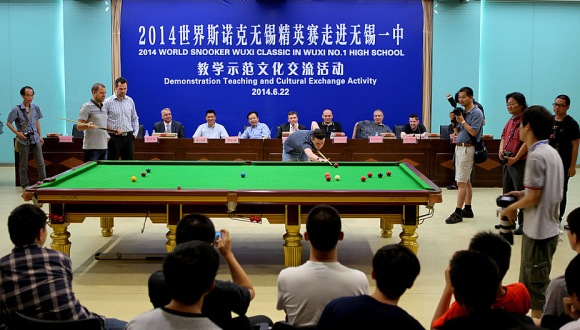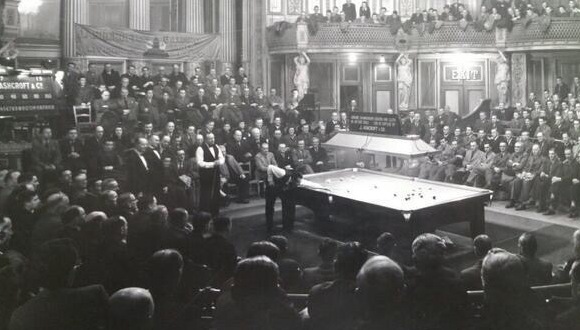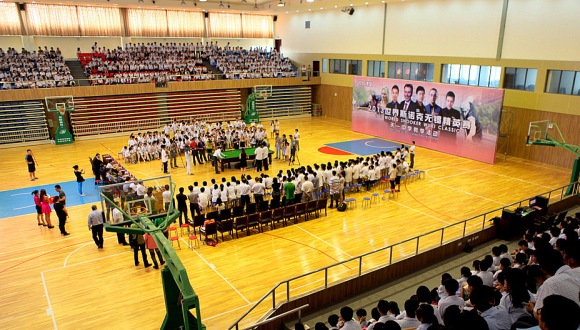
The Snooker China Open is being held in Beijing this week. We had an opportunity to interview Jason Ferguson, the chairman of World Professional Billiards and Snooker Association, and Miles Pearce, commercial director of World Snooker. World Snooker is apparently putting many efforts into the Chinese market in these few years, organizing many events such as International Championship, Masters, and China open here. This June, they will organize the World Cup in Wuxi.
The World Snooker World Cup is going to be held in China. What’s the difference between it and other events in China, such as Shanghai Masters, China Open, and International Championship?
Jason: The big difference is that the World Cup, obviously, is a team event. Each nation will get behind their own teams. The format is a lot different. We are playing single’s matches and double’s matches. This will add a different identity to the event. It will look different. You’ll see activities and national flags behind the background. You’ll have teams that will become good friends. And It is a very serious event.
So it will give snooker a different identity?
Jason: It will. The thing is that snooker is growing so fast around the world now, with so many new countries taking part in it. There are so many nations that can put teams together. In the past, the first World Cup is in 1979, there were 16. There are now 24 teams in the World Cup to be held in Wuxi. We have 18 different nationalities on our court now. This is a move of the organizing body to globalize snooker, to take it around the world, to ensure that different nations can get involved.
What’s the significance of it being here in China?
Jason: I think the Chinese market is being very strong for snooker. We held the last World Cup in Thailand. Again, in terms of an Asian country, Thailand is a very strong market for snooker. The thing with snooker is that it makes sense to bring it here now. Because we have established ranking events, such as China Open, Shanghai Masters. Wuxi is being a great city in support snooker. They have a perfectly built venue which can support the event. And the fans are very excited about the sport there and we are very excited to bring the World Cup there. So for me, it marks a next step for our development in China.
In terms of the next step of development in China, what exactly are your goals of developing snooker in China?
Jason: We have many, to be honest. One of them is to maintain a strong major event, work with strong brands, and make sure the image of the sport is very strong. We want to increase the activity in school with young people. We’ve established a very strong academy here in Beijing, which is introducing great players. We want to spread this out in China, and in other countries as well. So the next step is to grow our presence in the market. You know basketball and other sport. Snooker is very strong, but to maintain strong, we have to work very hard, and we won’t stop.
Actually snooker is not that strong compared to other sports like basketball and football around the world. In terms of global development, do you have any plans?
Jason: You’re absolutely right. But if we turn the clock back five years, our sport was predominantly a British sport. We have six events, and one event is outside England. We have very few events anywhere in Europe over the year. Now we have 28 events around the world. Snooker is a global sport. I actually made an acclaim that it is the fastest growing sport in the world now.
We are now sending our television to 87 countries in the World. Nearly half a billion people are watching snooker on TV around the world. These are incredible numbers, even if you compare the number to sport like basketball and football, snooker is a very strong television sport now.
We have to support the growth with proper sport development. We have to make sure each country has established governing body, coaches, and facilities. More importantly, snooker is an accessible sport. Anybody can play it. We have an incredible amount of activities around the world. That’s one of the big pushes through the governing bodies for its growth.
So do you have specific focuses around the world? Are you going to develop it more in Southeast Asia, America and Europe?
Jason: Yeah, we are doing it. Southeast Asia is very strong. There’re 42 countries in Southeast Asia playing it, and 44 countries in Europe. This year it is the first time ever we brought 7 countries together in the American region, to compete in the All American Championship. It was won by a Brazilian, and the player will join the tour next year. We’ll have a Brazilian team in the World Cup for the first time ever.
About the America, the South America, Brazil has many snooker players. They play a slightly different game and it’s slightly smaller, but it’s the same principles. So are the scores. Snooker is very strong there. We don’t have any major events there. So we’re looking at the possibilities in America now, establishing major events, on major televisions, and it may attract more people to play the sport.
We have to inspire people to play the sport. Ding Junhui has inspired this nation. It’s the same in other countries. Thailand has such a player, and this is why we held a World Cup there.
We have to develop players around the world. It is a key part of our job. One of the things we are doing to drive that, is that we are bidding for the Olympic Game in 2020 in Tokyo. Six months ago, people thought I was crazy when I said we were going to get into the Olympic Games. But actually it’s a reality now. Five years ago, we’re nowhere near the opportunity. We have to have a minimum of 75 countries competing to get into the Olympic Game. We have 90 countries playing snooker. We have 200 countries playing billiards sports -- pool, three-cushion billiards, carom, and snooker. We’re bigger than most sports in the Olympic Game now.
Miles: yeah. In terms of television audience, in terms of participation, in terms of global reach around the world. We’re bigger than most.
Jason: A lot will depend on the host nation. Snooker isn’t big in Japan, but pool and carom are very big. So we work with other billiards sports to make it happen.
The Olympic Games will open many doors. Just by making the bid alone, it has already opened doors for us. We already have new television companies that want to talk. We just videoed a television program to be played during the Rio Game in Brazil, for example, about billiards sport being an Olympic sport.
So what is the market in China? It is a good strong market. We know we can do a lot more here. But we also have territories around the world which are not developed properly yet. India, Sri Lanka, so many countries that we can develop. There are only a few of us. We are a very small team. (Laugh)
So your next focuses may be on the Southeast Asia and America?
Jason: Yeah. There are new countries in the Southeast Asia. Singapore, Malaysia. Very strong snooker player. Malaysia has snooker on the school curriculum for many years. We have coached in Malaysia for many years.
What about Ding Junhui? He’s not doing very well. He has boosted the development of the Chinese market. What if he failed and there are no other players in China to replace him?
Jason: You see this is why we established public sport development. The Beijing’s academy, I was there a few days ago. Full of young kids. The coaches were on time. The activities were, the training sessions were run. There are four or five great players there. Young boys. There is one coming through this week, Xia Xintong (translated according to the sounds). 16 years old. This boy will win a World Championship. He is the success of our work here. There are others. Yang Dingtao (translated according to the sounds), the youngest ever to win the Amateur World Championship. 14 years old.
There are many players coming through. We mustn’t rely on one person. Many years ago, we have a player called Alex Higgins in England. Everybody said, when Alex Higgins go, the sport will die. But, actually, Jimmy White came along. And everybody said “what are we gonna do when Jimmy White goes?” Ronnie O’Sullivan came along. The thing will happen here. When Ding’s gone ranking down, someone else will come up and take his place. This is evolution. Natural.
We think snooker’s commercial value is not fully realized. The ticket sales are not very good. Some players don’t have sponsorships. Some sponsorship is not very high. TV broadcasting is not very widespread. Do you agree? And what will you do about it?
Jason: I don’t the value of our sport is fully realized. We know we’ve got very strong brand. We have very strong sport. Our sponsors can have their names on television for many hours, in many different countries. If we will, eventually, through globalization, attract global brands, this is when the sponsorship market will really step up a next level.
And I agree. I think you have to look back again to where we’ve come from. We came from this little tiny island in Europe, called England, with a very small number of events. Over only four years, we built a global sport. We need to capitalize on that now. Now is the time to put in that extra marketing, to put in that extra video online with social media. And we’re building all the time. New platforms and contents.

Miles: Our ticketing in the last five years, to the Masters, for example, increased by 200%. The World Championship, sold out in December. I think in China, the Chinese people are not used to going to events like they are in the UK. I think they are learning. With the long Gevity go to, for example, the China Open, 11 years, they’re getting good numbers.
World Snooker is like FIFA. We have the sport. We are going make sure that World Snooker as a brand, is a business brand. The other part of it is what we need to invest and build. The World Snooker is pushing at it all the time. Our marketing strategy is going toward that part.
Jason: Five years ago, we began a five-year plan to build the sport at an international level. We’re nearly there. We are writing the next five year’s plan. Our prize money in five years has come from 3.4m pounds to 8.6m pounds. Our target is 10m pounds by the end of the year. People don’t get how strong the sport is, but they will in time.
Are you going to be considered about the demographic of audiences? We heard that in UK young people are not interested in it anymore.
Miles: That’s not actually true. We have television audiences that are hitting the retiree, they are watching over the day. In the evening sessions, we’ve got a lot younger people watching. If you look at demographic of people going to the events, they are much younger. The average is between 25 and 35 years old.
Jason: This year we will run the very first inter schools championship in England. There are now tens of thousands of children playing snooker in school. Now the players winning are in their 30s. The next batch of players will be much younger.
This is children in Wuxi. (showing a picture). Every city we go, we walk around and put facilities there. We are doing it in Shanghai, in Shenzhen. We put the teens in training. We put them in permanently. We leave tables in school, and train coaches in school. We’ve got this in Europe, in Southeast Asia.
